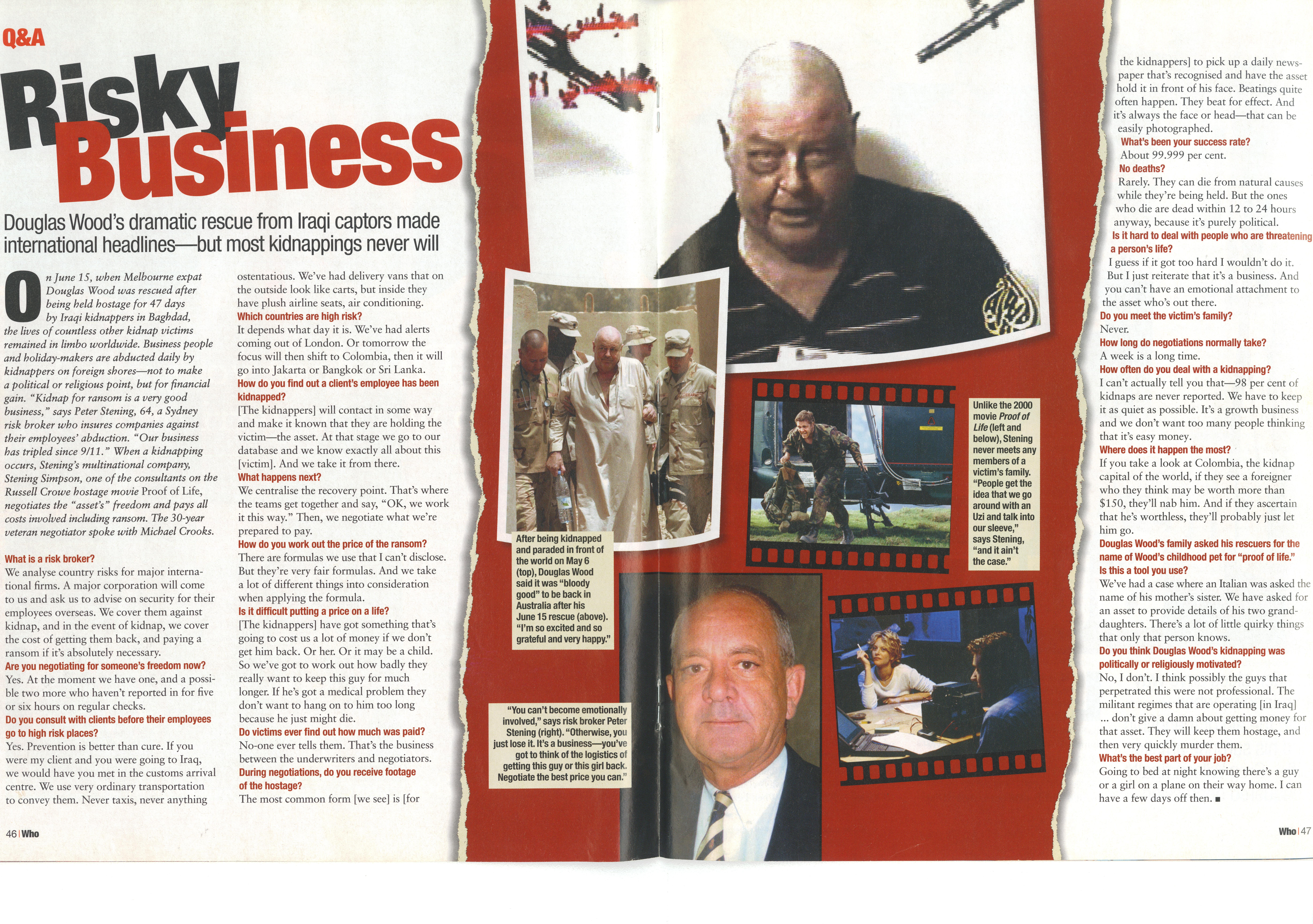RISKY BUSINESS
Published: “WHO” magazine 4 July 2005
Douglas Wood’s dramatic rescue from Iraqi captors made international headlines – but most kidnappings never will.
On June 15 when Melbourne expat Douglas Wood was rescued after being held hostage for 47 days by Iraqi kidnappers in Baghdad, the lives of countless other kidnap victims remained in limbo worldwide. Business people and holiday-makers are abducted daily by kidnappers on foreign shores – not to make a political or religious point, but for financial gain. “Kidnap for ransom is a good business, “says Peter Stening, a Sydney risk broker who insures companies against their employees’ abduction. “Our business has tripled since 9/11.” When a kidnapping occurs, Stening’s multinational company, Stening Simpson, one of the consultants on the Russell Crowe hostage movie Proof of Life, negotiates the “asset’s” freedom and pays all costs involved including ransom. The 30 year veteran negotiator spoke with Michael Crooks.
What is a risk broker?
We analyse country risks for major international firms. A major corporation will come to us and ask us to advise on security for their employees overseas. We cover them against kidnap, and in the event of kidnap, we cover the cost of getting them back, and paying a ransom if it’s absolutely necessary.
Are you negotiating for someone’s freedom now?
Yes. At the moment we have one, and a possible two more who haven’t reported in for five or six hours on regular checks.
Do you consult with clients before their employees go to high risk places?
Yes. Prevention is better than cure. If you were my client and you were going to Iraq, we would have you met in the customs arrival centre. We use very ordinary transportation to convey them. Never taxis, never anything ostentatious. We’ve had delivery vans that on the outside look like carts, but inside they have plush airline seats and air conditioning.
Which countries are high risk?
It depends what day it is. We’ve had alerts coming out of London. Or tomorrow the focus will then shift to Columbia, then it will go into Jakarta or Bangkok or Sri Lanka.
How do you find out a client’s employee has been kidnapped?[The kidnappers] will contact in some way and make it known that they are holding the victim – the asset. At that stage we go to our database and we know exactly all about this [victim]. And we take it from there.
What happens next?
We centralise the recovery point. That’s where the teams get together and say, “OK, we work it this way.” Then, we negotiate what we’re prepared to pay.
Is it difficult putting a price on a life?[The kidnappers] have got something that’s going to cost if we are to get him back. Or her. Or it may be a child. So we’ve got to work out how badly they really want to keep this person. If he’s got a medical problem they don’t want to hang on to them too long because they just might die.
Do victims ever find out how much was paid?
No one ever tells them. That’s the business between the underwriters and negotiators.
During negotiations, do you receive footage of the hostage?
The most common form [we see] is [for the kidnappers] to pick up a daily newspaper that’s recognised and have the asset hold it in front of their face. Beatings quite often happen. They beat for effect. And it’s always the face or head – that can be easily photograghed.
No deaths?
Rarely. They can die from natural causes while they’re being held. But the ones who die are dead within 12 to 24 hours anyway, because it’s purely political.
Do you meet the victim’s family?
Never.
How long do negotiations normally take?
A week is a long time.
How often do you deal with a kidnapping?
I can’t actually tell you that – 98 per cent of kidnaps are never reported. We have to keep it as quiet as possible. It’s a growth business and we don’t want too many people thinking that it’s easy money.
Where does it happen the most?
If you take a look at Colombia, if they see a foreigner who they think may be worth more than $150, they’ll nab the person. If they ascertain that the person is worthless, they’ll probably just let them go.
Douglas Wood’s family asked his rescuers for the name of Wood’s childhood pet for “proof of life” Is this a tool you use?
We’ve had a case where an Italian was asked the name of his mother’s sister. An “asset” has been asked to provide details of his two granddaughters. There are a lot of little quirky things that only that person knows.


